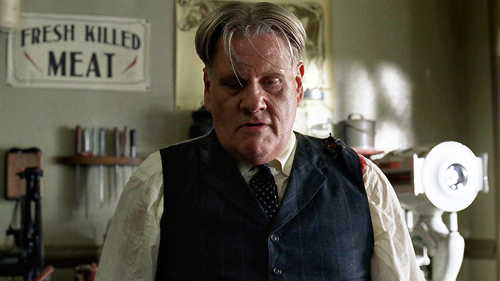
It’s not uncommon for an established, beloved and critically-acclaimed TV show to take a sudden plunge into generic, hackneyed, unwatchable dirge, never to recover. In fact, this is such a common occurrence on TV that there’s a term for it. However, from such depths or from a place of mediocrity, to one of sudden and undeniable brilliance, that is uncharted territory, until now.
Boardwalk Empire is a series that’s been met with major ambivalence from both TV critics and the viewing public. With its veritable dream team of HBO production mercenaries, spendthrift budget and ostentatious Marty Scorsese-directed premier, Boardwalk Empire needed to quickly make a splash in order to win over the public. It’s a condition being grappled with right now by NBC and Whitney Cummings due to their network’s overzealous support of her new sitcom, Whitney. Americans like an underdog story, and in the generation of the 99 and the 1 percent, a non-underdog has perhaps more to prove to a potential audience than ever before. As the first season of Boardwalk Empire played out, critics were mainly lukewarm on it’s efforts and while ratings were mainly high, the show’s viewership seemed as if they were waiting it out to see if something big was going to take place.
Of course, the show had its victories. It was just about unanimously agreed that the ensemble of actors on the Boardwalk were more than pulling their weight, in particular Steve Buscemi as the street smart and politically wise Nucky Thompson, Michael Shannon as the stone cold, god-fearing agent Van Alden, and Michael Stuhlbarg as the stoic and sinister Arnold Rothstein. They were among the most convincing dramatic performances that year, however the consensus was that the Boardwalk as a whole just wasn’t up to snuff. Even the Emmy’s seemed a perfect reflection of the show’s public reception, garnering a heavy plateful of nominations without winning a single major trophy. Things seemed grim, the show that looked to rekindle the narrative brilliance of The Wire with the nostalgic charm of Mad Men had succeeded at neither.
At the end of Boardwalk’s first season there was a sudden glint of hope at the very end of the final episode. Nucky’s brother, Jimmy, the Commodore and a few more of Nucky’s closest were conspiring against him for control of the boardwalk empire and finally the series showed promise of a plot-line that paid off. But was it too little too late? Newly won fans had a whole year to cool down before any more action was to occur.
Season 2, had it started immediately afterward, would have been fighting steady, albeit uphill, battle. Jack Huston’s portrayal of Richard Harrow, Jimmy’s half-masked do-anything solider and the addition of two major, historical Jewish mobsters (Meyer Lansky and Bugsy Seigel) along with a convincing war and some major character development channeled the kind of gusto that made The Wire a coup. Still, for many the show had yet to live up to its expectations.
All of this changed at the end of the recent episode entitled “Battle of the Century” in which an assassination attempt was made on the Manny Horvitz, the unkillable Jewish butcher, in lieu of Jimmy’s liquor debt. This failed assassination attempt was a pivotal moment which set in motion a series of events that lead to the series turning point, the killing of Jimmy’s wife and her lesbian lover which resulted in the tragic Oedipal hell of Jimmy’s existence that closed last night’s episode. Put all these things together and you’ve got a series reborn. Boardwalk Empire “popped the butcher,” and in doing so, it went from a mediocre series to a brilliant one, the polar opposite of “jumping the shark.”
The term “jump the shark” was coined by Jon Hein to describe the moment when a series begins its downslide to the point of no return. The term was a reference to a Happy Days episode wherein the Fonz becomes a poor man’s Evel Knievel and jumps over a shark during a waterskiing stunt. This episode marked the moment from which Happy Days would being to rely on such outlandish plots to fill it’s final seasons. The term quickly found its way into the English lexicon to the point of overuse. In 2008, New York Times columnist Frank Rich used to term to refer to Barack Obama and more recently, Rush commented that Michelle Bachmann had “jumped the shark.”
 Now that Boardwalk Empire has done the opposite of “jumping the shark” can it become the standard for the phenomena? Is there a precedent for what Boardwalk Empire has done?
Now that Boardwalk Empire has done the opposite of “jumping the shark” can it become the standard for the phenomena? Is there a precedent for what Boardwalk Empire has done?
NBC’s Parks and Recreation was initially perceived by most as a sad attempt by NBC to further profit off the genius of
However, “falling into the pit” seems less catchy than “popping the butcher” and the shift in Parks and Recreation wasn’t quite as drastic Boardwalk’s recent feat.
Boardwalk Empire in the last three episode has saddled itself up next to the greats of HBO original programming. With the exception of Mad Men, it’s hard to think of a currently running high-brow drama series with such an original and compelling plot-line. Thanks to the show’s sudden and drastic shift, Boardwalk Empire will go down in TV history and most certainly survive it’s way through a long and healthly life as a series.
Leave a Reply